Puff, Puff, Pass: The “Blunt” Truth About Cannabis Use Disorder in Adolescent and Young Adult Populations

Puff, Puff, Pass: The “Blunt” Truth About Cannabis Use Disorder in Adolescent and Young Adult Populations

Brought to You By
Dates and Times
-
-Live Webinar
Location
-
Live WebinarAccess virtually on TPN.health
In this session, we will explore current trends of substance use and abuse within adolescent and young adult populations. We will focus in on cannabinoid trends, identifying how the legalization of marijuana, in conjunction with public perception has impacted trends. Finally, the implications of cannabis use disorders within the brain, family systems, schools, communities, and treatment centers will be explored.
- • Counselors
- • Substance Use Disorder Professionals
- • Social Workers
- • Licensed Marriage and Family Therapists
At the end of this course, participants will be able to:
-
Evaluate the influence that legalization has on perception and use of THC.
-
Summarize the relationship between cannabis use and mental health in adolescent and young adult populations.
-
Describe 2 or more ways Cannabis Use Disorder impacts: schools, homes, and communities.
-
Association of cannabis use with cardiovascular outcomes among US adults | Journal of the American Heart Association. (n.d.). https://www.ahajournals.org/doi/10.1161/JAHA.123.030178
-
Farrelly, K. N., Wardell, J. D., Marsden, E., Scarfe, M. L., Najdzionek, P., Turna, J., & MacKillop, J. (2023). The impact of recreational cannabis legalization on cannabis use and associated outcomes: A systematic review. Substance Abuse: Research and Treatment, 17, 117822182311720. https://doi.org/10.1177/11782218231172054
-
Hopfer, C. (2014). Implications of marijuana legalization for adolescent substance use. Substance Abuse, 35(4), 331–335. https://doi.org/10.1080/08897077.2014.943386
-
Jugl, S., Goodin, A. J., & Brown, J. D. (2023). Climbing the evidence pyramid: Dosing considerations for medical cannabis in the management of chronic pain. Medical Cannabis and Cannabinoids, 6(1), 41–45. https://doi.org/10.1159/000530251
-
Khalsa, J. H., Bunt, G., Blum, K., Maggirwar, S. B., Galanter, M., & Potenza, M. N. (2022). Review: Cannabinoids as medicinals. Current Addiction Reports, 9(4), 630–646. https://doi.org/10.1007/s40429-022-00438-3
-
Meier, M. H., Caspi, A., Ambler, A., Harrington, H., Houts, R., Keefe, R. S., McDonald, K., Ward, A.,Poulton, R., & Moffitt, T. E. (2012). Persistent cannabis users show neuropsychological decline from childhood to midlife. Proceedings of the National Academy of Sciences, 109(40). https://doi.org/10.1073/pnas.1206820109
-
Rehman, Y., Saini, A., Huang, S., Sood, E., Gill, R., & Yanikomeroglu, S. (2021). Cannabis in the management of PTSD: A systematic review. AIMS Neuroscience, 8(3), 414–434. https://doi.org/10.3934/neuroscience.2021022
-
Sciences, N. A. of, Engineering, & Medicine, and. (2017, January 12). The health effects of cannabis and cannabinoids. National Center for Biotechnology Information. https://www.ncbi.nlm.nih.gov/books/NBK423845/
-
Volkow, N. D., Swanson, J. M., Evins, A. E., DeLisi, L. E., Meier, M. H., Gonzalez, R., Bloomfield, M.A., Curran, H. V., & Baler, R. (2016). Effects of cannabis use on human behavior, including cognition, motivation, and psychosis: A Review. JAMA Psychiatry, 73(3), 292. https://doi.org/10.1001/jamapsychiatry.2015.3278
-
Zehra, A., Burns, J., Liu, C. K., Manza, P., Wiers, C. E., Volkow, N. D., & Wang, G.-J. (2018). Cannabis addiction and the brain: A Review. Journal of Neuroimmune Pharmacology, 13(4), 438–452. https://doi.org/10.1007/s11481-018-9782-9
TPN.health has been approved by NBCC as an Approved Continuing Education Provider, ACEP No. 7267. Programs that do not qualify for NBCC credit are clearly identified. TPN.health is solely responsible for all aspects of the programs.
Trusted Provider Network, LLC is recognized by the New York State Education Department’s State Board for Mental Health Practitioners as an approved provider of continuing education for licensed mental health counselors. #MHC-0220.
This course has been approved by TPN.health, as a NAADAC Approved Education Provider, for educational credits. NAADAC Provider #198061, TPN.health is responsible for all aspects of the programming. Counselor Skill Group: Legal, Ethical and Professional Development.
TPN.health, #1766, is approved to offer social work continuing education by the Association of Social Work Boards (ASWB) Approved Continuing Education (ACE) program. Organizations, not individual courses, are approved as ACE providers. State and provincial regulatory boards have the final authority to determine whether an individual course may be accepted for continuing education credit. TPN.health maintains responsibility for this course. ACE provider approval period: 03/31/2022 – 03/31/2025. Social workers completing this course receive 1.5 continuing education credits.
Trusted Provider Network, LLC is recognized by the New York State Education Department’s State Board for Social Work as an approved provider of continuing education for licensed social workers #SW-0654.
Course meets the qualifications for hours of continuing education credit for LCSWs as required by the California Board of Behavioral Sciences. TPN.health is a CAMFT-approved continuing education provider, provider # 1000101. TPN.health maintains responsibility for this program/course and its content.
Trusted Provider Network, LLC is recognized by the New York State Education Department’s State Board for Mental Health Practitioners as an approved provider of continuing education for licensed marriage and family therapists #MFT-0097.
-
Waiting Room Opens
-
Workshop Begins
-
Workshop Ends



